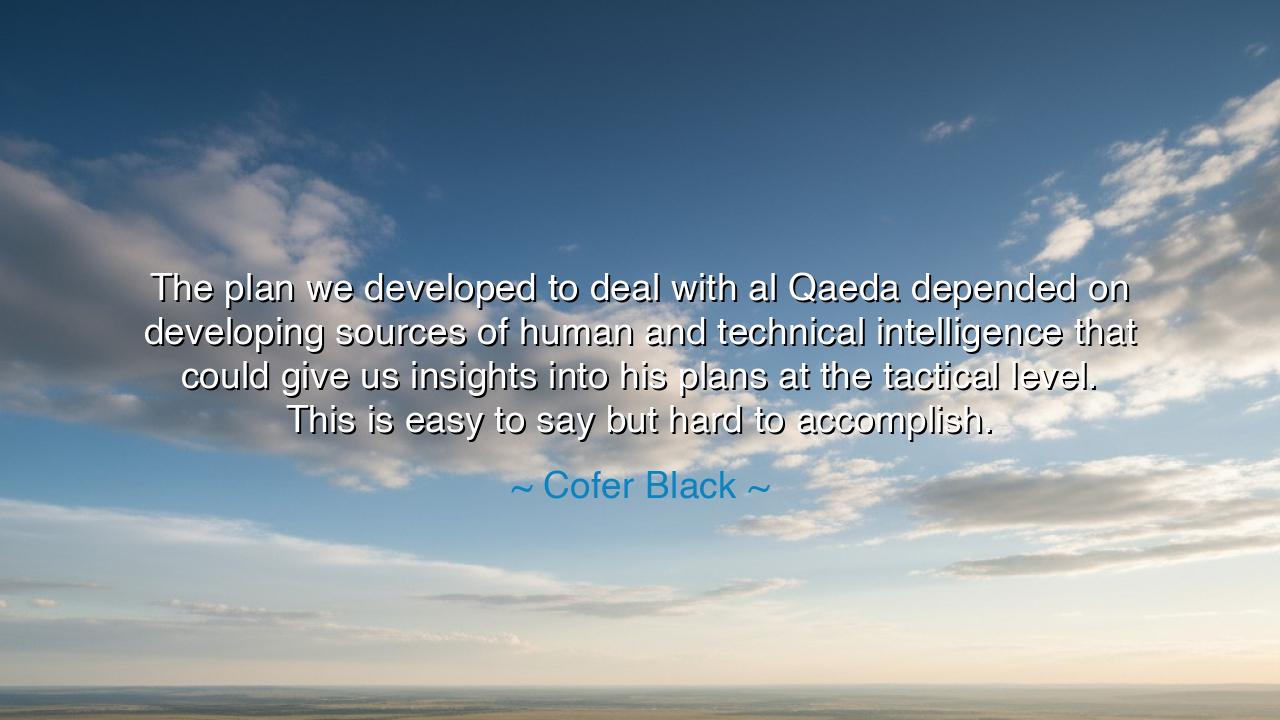
The plan we developed to deal with al Qaeda depended on
The plan we developed to deal with al Qaeda depended on developing sources of human and technical intelligence that could give us insights into his plans at the tactical level. This is easy to say but hard to accomplish.






In the grave and measured words of Cofer Black, a man who stood at the shadowed frontier between war and peace, we hear the voice of one who has wrestled with the complexities of protecting nations and preserving life: “The plan we developed to deal with al Qaeda depended on developing sources of human and technical intelligence that could give us insights into his plans at the tactical level. This is easy to say but hard to accomplish.” His statement, though spoken in the language of strategy, carries the timeless weight of wisdom: that knowledge, especially in times of danger, is not easily gained; that foresight is bought with patience, courage, and sacrifice. It is a truth as old as conflict itself — that understanding the enemy is both the hardest and most necessary task in any struggle.
Cofer Black, once a high-ranking officer in the Central Intelligence Agency, served in the critical years surrounding the rise of al-Qaeda and the attacks of September 11, 2001. His words reflect not merely an operational truth, but a philosophical one. In them lies the tension between clarity of vision and the chaos of reality, between the simplicity of plan and the complexity of execution. It is easy to proclaim that one must “know the enemy,” as the ancient strategist Sun Tzu once wrote, but to truly know — to pierce the fog of deceit, ideology, and fear — is a task that tests the very limits of human endurance. Black’s reflection, therefore, is not only about intelligence but about the deep, eternal struggle of seeing clearly in a world built on shadows.
Throughout history, nations and leaders have faced this same truth. Consider the tale of the Trojan Horse, when cunning overcame strength. The Greeks, unable to conquer Troy by force, turned instead to deception, to the use of intelligence and imagination as weapons of victory. Yet even then, the plan required patience, trust, and danger — for a single misstep could have doomed it all. The lesson of Cofer Black’s words echoes here: strategy without understanding is blind, and understanding without effort is impossible. The gathering of true knowledge, whether in war or in life, always demands risk and devotion.
When Black speaks of developing “sources of human and technical intelligence,” he describes a balance between two worlds — the cold precision of machines and the warm unpredictability of the human heart. The technical can gather data, intercept signals, and map movements, but only human intelligence can interpret desire, fear, and intent. Machines can hear, but they cannot understand. In this, his words rise above the field of espionage and enter the realm of philosophy: the reminder that wisdom comes not from information alone, but from the union of mind and empathy. It is the same lesson taught by sages of old — that the sharpest sword is useless if one cannot discern when and why to draw it.
The phrase “easy to say but hard to accomplish” may sound humble, yet it conceals the heroism of those who labor unseen in the pursuit of knowledge. For the work of intelligence — like the work of truth — often goes unpraised, carried out in silence, in secrecy, and in danger. Those who walk this path must live with uncertainty, often seeing their victories buried beneath the soil of confidentiality. Yet their struggle reflects a deeper human principle: that understanding is the highest form of defense, and that ignorance, however comfortable, is always perilous. To see truly is to protect wisely.
The lesson, therefore, extends beyond warfare and into every human endeavor. In life, as in strategy, it is “easy to say” that one will know oneself, one’s challenges, or one’s destiny — but “hard to accomplish.” To seek understanding in relationships, in leadership, or in one’s own heart demands the same persistence as gathering intelligence in the field. It means listening deeply, observing carefully, and refusing to act before understanding. The wise warrior and the wise soul alike must learn to gather insight before action, and clarity before courage.
So, my child of thought and purpose, heed the wisdom hidden within these words. Whether your battlefield lies in nations or in the soul, remember that plans without understanding are dreams, and knowledge without effort is illusion. Seek truth as the ancients sought the hidden fires of the stars — patiently, humbly, relentlessly. For though it is “easy to say” that you will master life, wisdom, or yourself, it is “hard to accomplish.” Yet in that difficulty lies your glory. For those who persist — who see beyond the surface of things — hold in their hands not only victory, but vision. And vision, born of courage and understanding, is the truest form of power.






AAdministratorAdministrator
Welcome, honored guests. Please leave a comment, we will respond soon